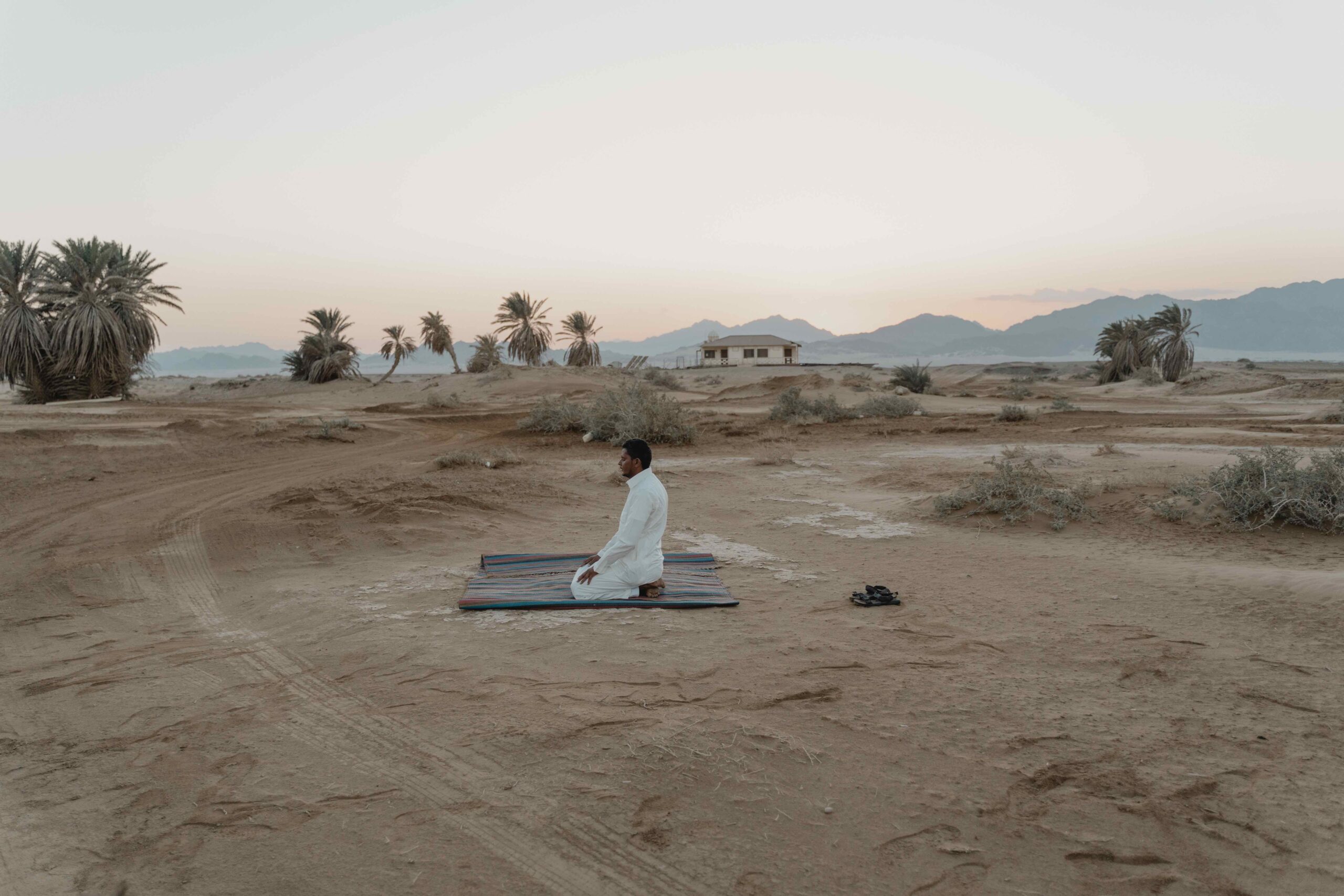Today’s mainstream climate justice discourse lacks a crucial element: it fails to adequately incorporate the Muslim voices advocating for climate justice vested in Islamic principles. The wisdom contained within the Quran, along with its embodiment in the life of Prophet Muhammad ﷺ, known as the Sunnah, provides comprehensive guidance on various aspects of human existence, including the paramount importance of upholding justice, safeguarding the truth, and protecting marginalized members of society. These rules are bound to a mechanism of accountability, rooted in the firm belief that everything in existence will return to the Al-Mighty to face His judgement.
These Islamic principles are all indispensable to the climate justice movement.
Islam Prescribes Justice for All Creation
Among the various terms used in the Quran to denote justice, the most prevalent is ‘Adl’, which signifies “to be equal to, just, straight, and temperate“. Throughout the Quran, Allah emphasizes the importance of justice, such as in this eloquent verse, considered to be one of the greatest expressions of justice in history:
“O you who have believed, be persistently standing firm in justice, witnesses for Allāh, even if it be against yourselves or parents and relatives. Whether one is rich or poor, Allāh is more worthy of both. So follow not [personal] inclination, lest you not be just. And if you distort [your testimony] or refuse [to give it], then indeed Allāh is ever, of what you do, Aware”.
Quran, An-Nisa 4:135, Saheeh International
The Quran’s emphasis on justice is reiterated by Prophet Muhammad ﷺ on a number of occasions. In an authentic tradition, he ﷺ conveyed the words of Allah by stating, “O My servants, I have forbidden oppression for Myself and have made it forbidden amongst you, so do not oppress one another” (Sahih Muslim: 2577). The use of powerful language clearly demonstrates how perpetuating any form of oppression falls outside the boundaries of what Islam constitutes permissible.
Islam prescribes the requirement to be just no matter the circumstances, as underscored in this verse where Allah commands, “O you who have believed, be persistently standing firm for Allāh, witnesses in justice, and do not let the hatred of a people prevent you from being just. Be just; that is nearer to righteousness”.
This call to uphold justice is not exclusive to humanity; it extends to all of God’s creation, encompassing the safeguarding of the rights of animals and the environment. Allah emphasizes in the Quran: “And there is no creature on [or within] the earth or bird that flies with its wings except [that they are] communities like you.” (Saheeh International: 6:38).
In Islam, the entire creation is held as sacred, and each part of it demonstrates a degree of consciousness through its active worship of Allah: “Do you not see [i.e., know] that to Allāh prostrates whoever is in the heavens and whoever is on the earth and the sun, the moon, the stars, the mountains, the trees, the moving creatures and many of the people?” (Saheeh International: 22:18).
These verses prove how the creation of God is similar to humans—everything in existence is sacred and worships the same God. There is an explicit duty for humans to honour and protect all creation of God as His Khalifa on Earth (steward or viceregent).
Advocating for Truth
Islam places immense importance on the value of truthfulness. One of God’s divine qualities is Al-Haqq, The Truth, as exemplified in the Quran: “For that is Allāh, your Lord, the Truth. And what can be beyond truth except error?” (Saheeh International: 10:32).
In the Quran, Allah also highlights the significance of truthfulness on the Day of Judgment, stating, “This is the Day when the truthful will benefit from their truthfulness” (Saheeh International: 5:119). This emphasis on speaking the truth is particularly commended in times of hardship in the Prophet’s ﷺ narration: “The most noble struggle is to speak a truthful word in the presence of a tyrannical ruler” (Jamiʿ al-Tirmidhī: no. 2174). For climate justice to prevail, it is incumbent to establish the truth of the cause of climate change and those who have caused it. Unveiling climate injustices through truth-telling is the first step in aiming to restore climate justice.
Seeking Justice for the Vulnerable
Islam places particular emphasis on the protection of the marginalized members of society. On one occasion, upon hearing about the mistreatment of an elderly woman in Abyssinia, Prophet Muhammad ﷺ said, “How can Allah purify any people (of sin) when they do not support their weak from their strong?” (Sunan Ibn Mājah: no. 4010).
The responsibility to protect the marginalized does not stop at humans, in fact, Islam extends accountability to the well-being of even the most vulnerable non-human beings. This instruction is exemplified in the Quranic account of Prophet Solomon, where the profound importance of just governance and accountability is underscored through the voice of a humble subject of King Solomon, an ant: “Until, when they came upon the valley of the ants, an ant said, ‘O ants, enter your dwellings that you not be crushed by Solomon and his soldiers while they perceive not.’” (Saheeh International: 27:18 – 27:19).
The ant’s words not only reach the ears of its king but are also recognized and honoured by God Himself through the immortalization of this story in the Quran. Prophet Solomon, deeply moved by the ant’s courage, responds with humility and empathy by offering a prayer seeking God’s guidance toward righteousness. He acknowledges that while he may possess the most extensive kingdom on Earth, ultimately, it is to God that we return: “So [Solomon] smiled, amused at her speech, and said, ‘My Lord, enable me to be grateful for Your favour which You have bestowed upon me and my parents and to do righteousness of which You approve. And admit me by Your mercy into [the ranks of] Your righteous servants’” (Saheeh International: 27:18 – 27:19).
This verse firmly establishes the profound sense of accountability within Islam: those who hold the highest positions of privilege are obliged to respond to the needs of those in the most vulnerable states. Regardless of the power concentrated in one’s hand, ultimately Allah is the Most Powerful and everyone is accountable under His divine law. These principles of seeking justice for the vulnerable pave the path for Muslims to correct the climate wrongs disproportionately harming marginalized people around the world. All actors who are responsible for causing climate change and are continuing on a polluting trajectory despite the visibly destructive consequences must be held to account.
Climate Change: Human-Caused Corruption on Earth
In the past century, modernization has sidelined religious thought for decision-making, opting instead to rely exclusively on science to provide solutions for all of humanity’s problems, whether they be rational or moral. The acceleration of technological progress along this path has given rise to the notion that humans are distinct from, and possibly superior to, nature, with the ability to shape it according to their own desires. This thought has further led man to believe that through his ingenuity and scientific endeavours he can solve all problems, even winning the current war against nature.
This arrogance, though, appears to be crumbling as the entire world and its leaders are scrambling to undo what man’s hands have brought forth. Climate change is a form of human-caused corruption that has spread across the Earth and its roots are found in the unjust capitalist system that drives hyperconsumerism in our society. In other words, it is the same greed that Allah has warned us of in the Quran:
“And you consume inheritance, devouring [it] altogether, And you love wealth with immense love. No! When the earth has been leveled – pounded and crushed, and your Lord has come and the angels, rank upon rank, and brought [within view], that Day, is Hell – that Day, man will remember, but how [i.e., what good] to him will be the remembrance?”
Al-Fajr, 89: 19 – 23, Saheeh International.
Reminder to Return to the Right Path
The foreshadowing of humans causing corruption on Earth is reiterated in another verse of Surah Ar-Rum in the Quran where Allah describes the consequences of man’s actions on Earth:
“Corruption has appeared throughout the land and sea by [reason of] what the hands of people have earned so He [i.e., Allāh] may let them taste part of [the consequence of] what they have done that perhaps they will return [to righteousness].”
Quran 30:41, Saheeh International
For a reflective Muslim, however, the unravelling of the ecological crisis in our lifetimes is a mercy from God. The truth of these Divine words is witnessed in the ongoing anthropogenic climate catastrophe. Despite his arrogance, man is intricately woven into the very fabric of the natural world and cannot survive severance from it. This verse provides an invitation to correct our wrongs and to move towards a lifestyle where we can thrive by living in balance with nature.
The blessings bestowed upon us by the natural realm are innumerable, as expressed in the Quran: “So which of the favours of your Lord would you deny?” (Quran 55:13, Saheeh International). However, perhaps the most significant aspect of this relationship lies in the fact that the natural world serves as a reflection of Al-Mussawwir, the Divine Fashioner. Everything God brings into existence serves as a sign for man to seek and understand Him. Therefore, the diminishing quantity and declining quality of these signs is also reason for contemplation, and their manifestation in our lifetime presents an opportunity for us to return to the righteous path.
We must return to God in our lifetimes before our ultimate return to Him. This is the beginning of seeking climate justice for all. Islam provides a complete framework for reversing the impacts of global warming while restoring justice to those who have been stripped of living a decent and healthy life on Earth due to the violence of climate change. Muslims must take the mantle of organizing to envision an Islamic framework for climate action—embedded in the principles of Islam and the life of Prophet Muhammad ﷺ. By doing so, we will naturally arrive at meaningful, effective and inclusive climate solutions that recognize the hardships of front-line communities, prioritize safeguarding their livelihoods and dignity, and hold the wrong-doers accountable for widespread corruption around us in the form of climate change. This is the promise of Allah, the Most Just.



